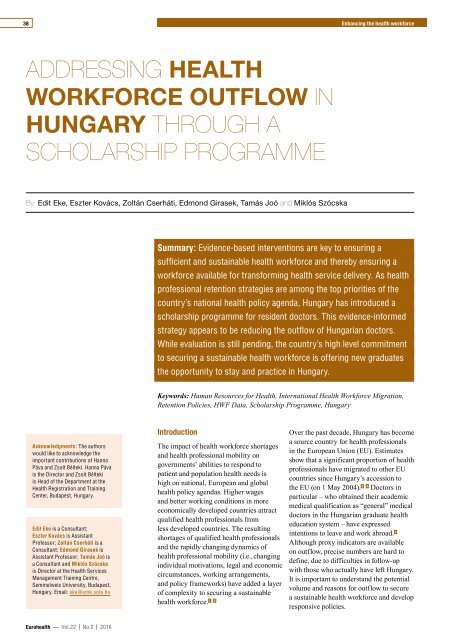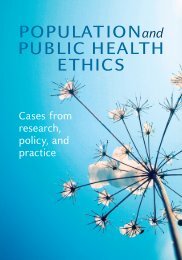EUROHEALTH
Eurohealth-volume22-number2-2016
Eurohealth-volume22-number2-2016
Create successful ePaper yourself
Turn your PDF publications into a flip-book with our unique Google optimized e-Paper software.
38<br />
Enhancing the health workforce<br />
ADDRESSING HEALTH<br />
WORKFORCE OUTFLOW IN<br />
HUNGARY THROUGH A<br />
SCHOLARSHIP PROGRAMME<br />
By: Edit Eke, Eszter Kovács, Zoltán Cserháti, Edmond Girasek, Tamás Joó and Miklós Szócska<br />
Summary: Evidence-based interventions are key to ensuring a<br />
sufficient and sustainable health workforce and thereby ensuring a<br />
workforce available for transforming health service delivery. As health<br />
professional retention strategies are among the top priorities of the<br />
country’s national health policy agenda, Hungary has introduced a<br />
scholarship programme for resident doctors. This evidence-informed<br />
strategy appears to be reducing the outflow of Hungarian doctors.<br />
While evaluation is still pending, the country’s high level commitment<br />
to securing a sustainable health workforce is offering new graduates<br />
the opportunity to stay and practice in Hungary.<br />
Keywords: Human Resources for Health, International Health Workforce Migration,<br />
Retention Policies, HWF Data, Scholarship Programme, Hungary<br />
Acknowledgments: The authors<br />
would like to acknowledge the<br />
important contributions of Hanna<br />
Páva and Zsolt Bélteki. Hanna Páva<br />
is the Director and Zsolt Bélteki<br />
is Head of the Department at the<br />
Health Registration and Training<br />
Center, Budapest, Hungary.<br />
Edit Eke is a Consultant;<br />
Eszter Kovács is Assistant<br />
Professor; Zoltán Cserháti is a<br />
Consultant; Edmond Girasek is<br />
Assistant Professor; Tamás Joó is<br />
a Consultant and Miklós Szócska<br />
is Director at the Health Services<br />
Management Training Centre,<br />
Semmelweis University, Budapest,<br />
Hungary. Email: eke@emk.sote.hu<br />
Introduction<br />
Over the past decade, Hungary has become<br />
a source country for health professionals<br />
The impact of health workforce shortages<br />
in the European Union (EU). Estimates<br />
and health professional mobility on<br />
show that a significant proportion of health<br />
governments’ abilities to respond to<br />
professionals have migrated to other EU<br />
patient and population health needs is<br />
countries since Hungary’s accession to<br />
high on national, European and global<br />
the EU (on 1 May 2004).<br />
health policy agendas. Higher wages<br />
3 4 Doctors in<br />
particular – who obtained their academic<br />
and better working conditions in more<br />
medical qualification as “general” medical<br />
economically developed countries attract<br />
doctors in the Hungarian graduate health<br />
qualified health professionals from<br />
education system – have expressed<br />
less developed countries. The resulting<br />
intentions to leave and work abroad.<br />
shortages of qualified health professionals<br />
5<br />
Although proxy indicators are available<br />
and the rapidly changing dynamics of<br />
on outflow, precise numbers are hard to<br />
health professional mobility (i.e., changing<br />
define, due to difficulties in follow-up<br />
individual motivations, legal and economic<br />
with those who actually have left Hungary.<br />
circumstances, working arrangements,<br />
It is important to understand the potential<br />
and policy frameworks) have added a layer<br />
volume and reasons for outflow to secure<br />
of complexity to securing a sustainable<br />
a sustainable health workforce and develop<br />
health workforce. 1 2 responsive policies.<br />
Eurohealth — Vol.22 | No.2 | 2016
















